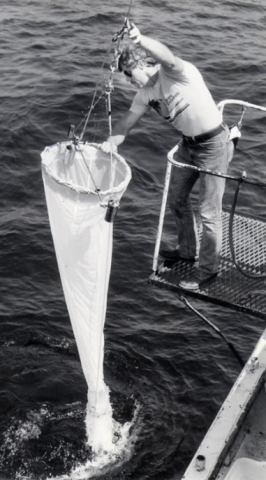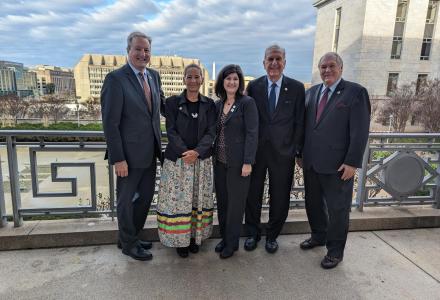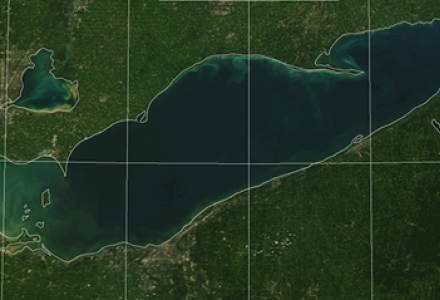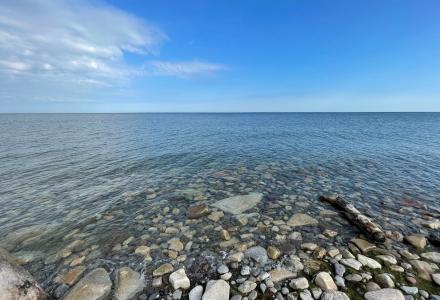


The first quarter of 2019 brought the passing of two scientists who dedicated much of their lives to the Great Lakes, as well as an IJC Commissioner and board member from the region. We celebrate their contributions to science and policy and the rich legacy that will live on thanks to the dedication of these four individuals.
Remembering Dr. Al Beeton

Dr. Alfred Merle Beeton, a leading researcher on the Great Lakes, died on April 24. As one of the first scientists to sound the alarm about Lake Erie, he provided valuable research on the effects of eutrophication and pollution needed to restore the lake.
Beeton heralded several of the IJC’s most effective research initiatives during his time as co-chair of the Great Lakes Science Advisory Board from 1987 to 1991, and created a new generation of Great Lakes scientists through his many years at the University of Wisconsin-Madison and the University of Michigan.
Beeton was born August, 15, 1927, and earned his bachelor’s, master’s and Ph.D. degrees from the University of Michigan in the 1950s, specializing in limnology and aquatic zoology. He taught there for most of his career and at Wayne State University in Detroit, from 1952 to 1961 and University of Wisconsin-Milwaukee from 1966 to 1976. In Milwaukee, he served as associate director of the Center for Great Lakes Studies and as a consultant to several federal and international projects dealing with limnologic and pollution issues.
When he returned to University of Michigan, Beeton taught at its School of Natural Resources (now called the School for Environment and Sustainability) and College of Engineering, and was director of its Great Lakes and Marine Waters Center and Michigan Sea Grant College Program. He also chaired the committee that designed the federal Great Lakes Environmental Research Laboratory and became its director in 1986. He served as a commissioner on Michigan’s Toxic Substance Control Commission, president of the National Sea Grant Association and on numerous environmental and scientific advisory boards.
He is remembered for his kindness, warm smile, keen intellect and devotion to the Great Lakes, and with gratitude for the generation of Great Lakes scientists he created through his teaching career. He is survived by his wife Ruth and children Maureen, Celeste, Jonathan and Daniel, and eight grandchildren. A collection of papers published during his career is available at the University of Michigan’s Bentley Historical Library.
Remembering Commissioner Donald Totten

 Donald Lee Totten, a US Commissioner from 1981-1990, died on April 2. President Ronald Reagan appointed Totten to the IJC, where he focused his efforts on Great Lakes water quantity and quality issues.
Donald Lee Totten, a US Commissioner from 1981-1990, died on April 2. President Ronald Reagan appointed Totten to the IJC, where he focused his efforts on Great Lakes water quantity and quality issues.
A longstanding leader in the Republican Party in Illinois, he led Reagan’s elections in the state in 1976 and 1980 and was a member of the president’s transition team in 1980.
Totten was born February 19, 1933, in Brooklyn, New York, and grew up in New Jersey. He graduated with a degree in mechanical engineering from Notre Dame in 1955 and worked in the field in Chicago until becoming involved in local, state and national politics. He was elected a Republican committeeman of Schaumburg Township, Illinois, in 1966, elected to the Illinois legislature in 1972 and received the Illinois Conservative Union’s Legislator of the Year award in 1977. He became a state senator in 1980 and was elected chair of the Cook County Republican committee in 1985. After his IJC term ended, he was selected as director of the Regional Transportation Authority in 1990. He also was president of a consulting firm specializing in government relations, management and political consulting.
Totten is survived by two daughters, Diane Faldstein and Kathy Weber, son Robert, seven grandchildren, one great grandson and his sister Betty.
Remembering David Rathke
On February 14, the Great Lakes community and Region 8 of the US Environmental Protection Agency lost a well-respected scientist and dear colleague.

David Rathke was born September 23, 1947, in Rockford, Illinois. His love of the outdoors and inquisitive mind led him to The Ohio State University where he received his Ph.D. in limnology in 1979. Rathke worked for Ohio State’s Center for Lake Erie Area Research from 1973 to 1978 while completing his Ph.D. research and worked at the university’s Stone Laboratory – a 124-year-old field station on Gibraltar Island in Put-In-Bay in Lake Erie ̶ where he made an enormous contribution to our understanding of Lake Erie.
Rathke worked on several IJC projects and eventually became a contract employee at the IJC’s Great Lakes Regional Office in Windsor, Ontario. His work included comprehensive assessments of the health of the Great Lakes, helping to develop the Great Lakes International Surveillance Plan, providing key leadership in the Areas of Concern program and developing the scientific foundation for cleaning up some of the most polluted spots in the Great Lakes.
Throughout a 17-year tenure working on the lakes, Rathke authored more than 20 scientific publications on Lake Erie, numerous IJC reports and helped organize many special sessions and presentations at the International Association for Great Lakes Research’s annual conferences and other events.
Rathke left a legacy of Great Lakes science, environmental protection and transboundary cooperation on water resource management. He is survived by his wife Pam, sister Rose and others.
Ohio Sea Grant is establishing a scholarship in Rathke’s name at Stone Laboratory on Lake Erie. Memorial gifts can be made to Ohio Sea Grant either by check (Ohio Sea Grant Office (Attention: Erin Monoco/David Rathke), 1314 Kinnear Road, Area 100, Columbus, OH 43212-1156) or online.
Remembering David Witherspoon
Witherspoon was born in Toronto on December 27, 1923, and enjoyed summers on his uncles' farms near Woodbridge.
He joined the Royal Canadian Air Force during World War II and later attended the Ontario Agricultural College (OAC), graduating in 1950 with a degree in agricultural engineering. He completed his master’s at Michigan State University followed by studies at the Hydraulic Institute in Delft, Netherlands.
Witherspoon was an assistant professor in the Department of Engineering at OAC before moving to Cornwall to become the director of the Great Lakes/St. Lawrence Study Office with Environment Canada for many years, where he was responsible for coordinating water levels on the Great Lakes until his retirement in 1986.
He was involved in supporting the IJC’s Great Lakes control boards, and was a member of the International St. Lawrence Board of Control and Lake Superior Board of Control.
Donations can be made in his name to the St. Lawrence River Institute.

Sally Cole-Misch is the public affairs officer for the IJC’s Great Lakes Regional Office.

John Hartig is a visiting scholar at the University of Windsor’s Great Lakes Institute for Environmental Research, where he studies the cleanup and restoration of Great Lakes Areas of Concern. Hartig has been involved in SOS conferences since their inception in 1998 and served as co-chair of the 2022 conference.




